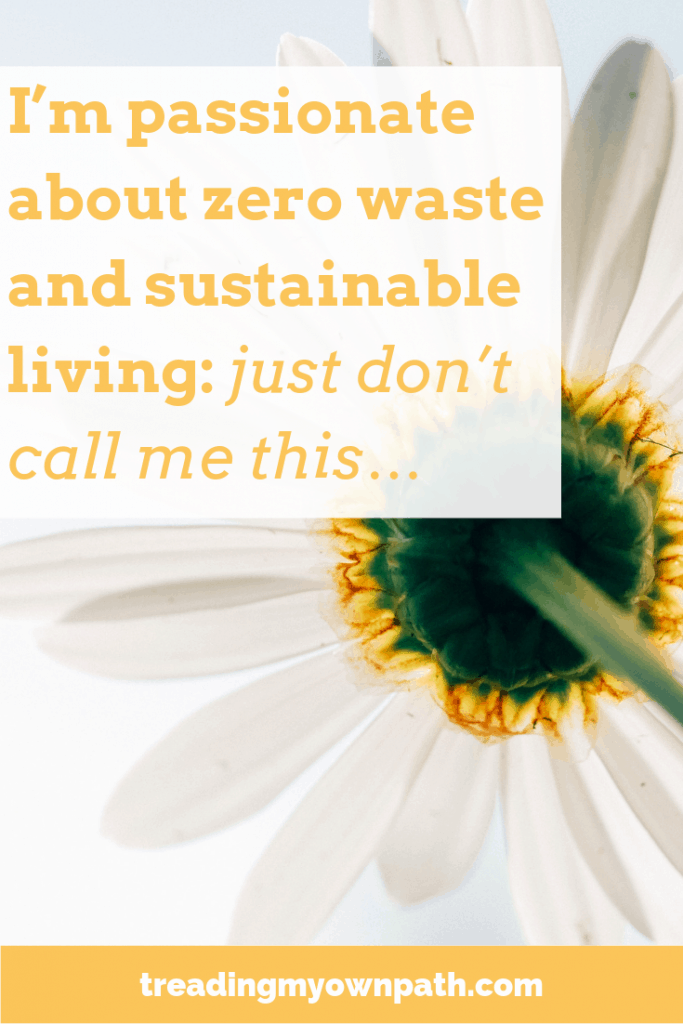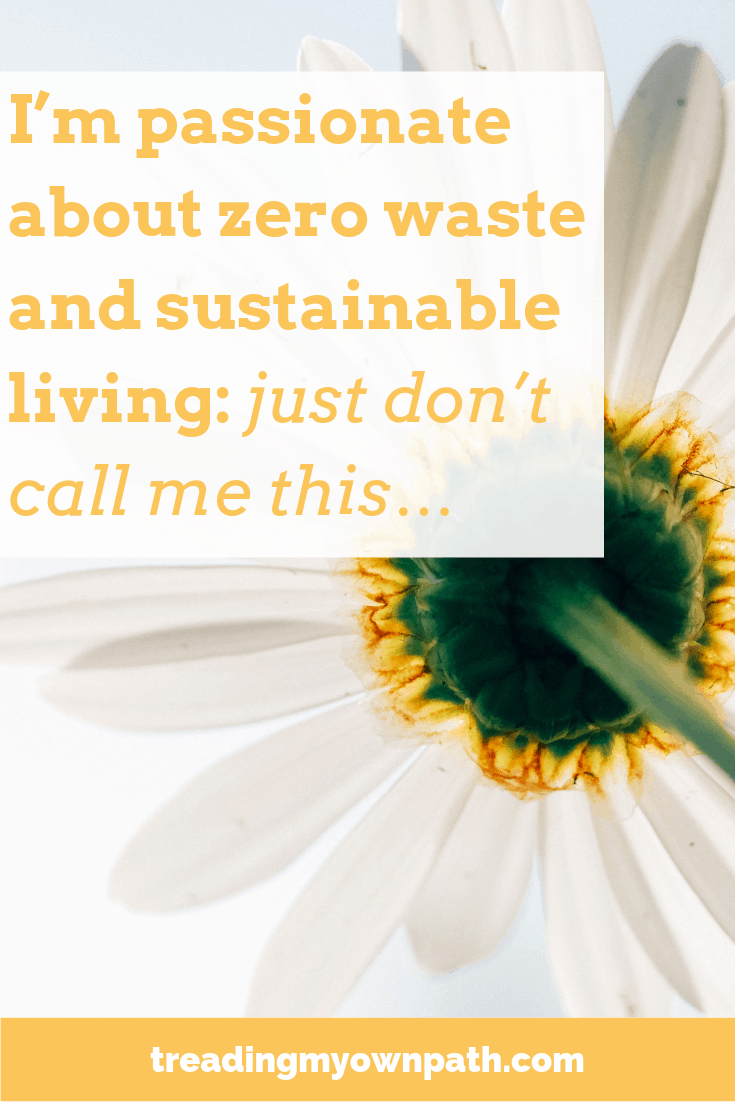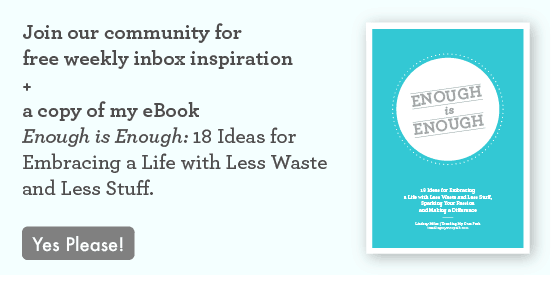I’m passionate about zero waste and sustainable living, just don’t call me this…
There’s one word I try to use as little as possible when it comes to talking about zero waste, living plastic-free or anything sustainable living related. In fact, I try never to use it at all.
Could you guess what it is?
I’ll tell you, and you might be surprised. Because it’s a word we hear often. Sometimes it’s even prefaced with words like “responsible” or “ethical” or “conscious” – so how could it not be a good word to use, with such honourable descriptors?
The word is this: consumer.
Now, I consume. We all consume. From food and water, to energy, to the things we buy to use and wear and own, we are consuming.
But calling myself a consumer? That implies that the main thing of value I have to offer is my ability to use up resources.
Being first and foremost a consumer means declaring that our best and most valued traits are our shopping habits.
And that is not the case at all.
I just don’t… I just can’t… identify with being a consumer above all else.
When was it decided that we would be reduced simply to consumers, to cogs in the economy, our value judged by what and how and how much we buy?
I try to never label myself (or anyone else) a consumer, and I don’t want to be labelled a consumer. I don’t really want to be called a responsible consumer, an ethical consumer or a conscious consumer, for that matter.
Yes, I try to consume responsibly, ethically and consciously. But I don’t identify as someone who buys stuff. I feel that labelling someone a consumer takes away their power, and says – the only way that you have influence is by shopping.
We have power. To share ideas, to express our opinions, to call out companies, to make our voices heard, to apply pressure to businesses and governments, to vote, to demand change, and to ask for things to be different.
Our power extends far beyond the things we buy.
Let’s not give our power away.

So if we don’t call ourselves consumers, what do we call ourselves instead?
The way I see it: we are community members. We are citizens. We are people (both as individuals and groups) who care a great deal about the planet and our children’s future.
But somehow this label of ‘consumer’ has got pushed to the forefront and rather than saying “I’m a concerned and passionate citizen” we are reducing ourselves to just one part of the whole: a ‘conscious consumer’.
I am so much more than that, you are so much more than that; we are so much more than that.
Now I’m sure we’ve all heard the saying “money talks” and the idea that “we can vote with our dollars for the change we want to see”. And I do believe that this is true: we can vote with our dollars.
But voting with our dollars does not have to mean shopping, or buying, or even consuming.
It can mean choosing green energy, or opting for public transport, or donating money to charitable causes, or contributing to organizations whose work we admire.
In fact, sometimes we “vote with our dollars” when we don’t buy anything at all.
I vote with my dollars when I opt out of the formal economy and swap stuff, share stuff, and make do with what I have.
And yes, I vote with my dollars when I shop at the local bulk store, or buy something from the charity shop.
Very occasionally I’m voting with my dollars when I buy something brand-spanking-new from a store, or less frequently, that has to get shipped from interstate.
Because yes, I consume. I try to consume responsibly, and ethically, and consciously. (And minimally yes, but I do still consume.)
That does not reduce me to a consumer.
Did you see the Guardian article published earlier in May which stated that it had updated its style guide to reflect more accurately the environmental crises facing the world?
So “climate change” is now “climate emergency” or “climate breakdown”, and “global warming” is now “global heating”. The editor-in-chief of the Guardian was quoted as saying that they wanted to ensure that they are being scientifically precise, and communicating clearly.
“The phrase ‘climate change’”, she said, “sounds rather passive and gentle when what scientists are talking about is a catastrophe for humanity.â€
The words we use to describe things are important. Stronger language definitely invokes stronger reactions. Climate breakdown clearly has a sense of urgency that climate change does not.
And ‘concerned citizen’ has a power and gravitas to it that ‘responsible consumer’ does not.
Plus, it’s far more accurate.
We cannot make the world a better place simply by consuming better. We have a chance, we have a choice and we have, I think, a responsibility to do more than simply buy things to try to create positive change.
Let’s share ideas. Let’s share resources. Let’s champion those that do good, and hold those that do not to account. Let’s sign petitions, let’s add our voice to campaigns for change, lets write to our politicians and governments. Let’s get involved where we can, and put our energy into things that matter.
Let’s consume consciously. But let’s not give our power away and reduce ourselves to being consumers, first and foremost. That is not who we are, and that is not the limit of what we can do.
The truth is, we will never save the world by shopping.
Now I’d love to hear from you! Do you agree, disagree, did you learn something new, have you changed your mind or are you sticking with the status quo? Whatever your thoughts are I’d love to hear them so be sure to leave a comment below!








Woohoo! Yes! I detest our consumerist mindset and all that goes with it, although I confess I am still having to drag myself out of it sometimes… It’s like we all have been brought up to unconditionally worship the god of the Economy and the way we do that is through being consumers. Excellent post.
Thanks Sandy! Yes it definitely takes practice to shift our mindset. It’s something I’ve been conscious of for a few years but even now I occasionally here the word “consumer” slip out of my mouth! Even when I’m actually talking about consuming and buying stuff, I still try to use language like “citizen” instead. I also think language like ‘community member’, ‘group’, ‘citizen’ all imply interconnectedness, whereas ‘consumer’ puts us right back into that individualism mindset.
PS I love your analogy “unconditionally worship the god of the Economy” – it’s funny but it’s also kind of true! :/
As the word “product”, which is now widely used even in non- commercial contexts (like education, for example). I hate this idea of applying capitalist terms to any type of relation.
That’s a really good point, Violet. And reducing nature to assets (like the economic value of a river or a forest) also makes me sad. Not everything is measured in money!
Yes, I agree that we must stop buying things. That’s why I’ve borrowed your book from the library. I think libraries are fantastic. They have 1,000s of books that I can read at zero cost to me and zero waste.
I think we will always need to buy some things Dawn, but it is definitely not the focus of our lives and the less we can buy, the better! That’s great about the library – I’m sure you’ve heard me harping on about them many times. I love libraries! Such an amazing resource. I think I own about 15 books, all ones that I like to refer back to, or that I want to lend out to people – or that the library didn’t have. And owning them now doesn’t mean owning forever, there will come a point when I choose to pass them on. The rest of my books, I borrow from the library. Hurrah! Hope you enjoy my book and thanks so much for your support :)
I often have short term rental guests stay with me and the ones I like the least are those I call ‘consumers’. They shop up large, leave numerous expensive shopping bags behind, lots of rubbish and general waste including food and other stuff they have over purchased, do not recycle anything and are generally inconsiderate. So I’m not surprised you don’t like the term Lindsay.
Wow that would drive me crazy, Frances! I don’t know how you put up with it! I remember reading an article by George Monbiot once (I think it was about Christmas presents) and he said you can consume or you can conserve but you can’t do both. It’s a good point. The more we talk about consuming, the less we talk about conserving. And we need to switch this around!
Truly thought-provoking! I love how you look at things from a different perspective, it reflects in your posts.
Tbh when I initially started going-through your post, I didn’t agree with you but towards the end I was totally convinced with your thoughts. Bloggers like you are the real trailblazers!
Ah thank you Neha! I think we are so used to being called consumers, and obviously being called a conscious consumer or a responsible consumer sounds like a good thing, that at first it is a little jarring. But we can consume responsibly without being first and foremost a consumer! Thanks for seeing things from my perspective – the way I see it, we are concerned citizens and passionate members of the community before anything else!
i’ve always found the word ‘consumer’ somehow intrinsically revolting. reductive. dehumanising. most of the words associated with economics tend to feel like that: ‘market share’ ‘capital’, the word ‘resources’ applied to people, other living beings and systems of earth…
to me, ‘consumer’ is basically the modern equivalent of ‘serf’: a person tied to a system he/she does not control, and valued only for his/her purchasing patterns and capabilities, held in place by a oligarchy of wealthier people who do control and benefit from the system.
to say “i am not a consumer” is to declare emancipation from an unsustainable, artificial, and exploitive system, and a declaration of allegiance to the greater patterns of life.
Ooooh thanks for this, great thoughts! That’s one thing that I didn’t talk about, the fact that the idea of “consumer” is very individualistic. By calling ourselves consumers we are reduced to our individual actions, specifically what we buy and use. And I totally hear you about capitalist language being used to describe “assets” like trees, water and the air. Not everything is measured in money…
Yes, yes, yes. Brilliant, powerful post that resonates deeply with this anti-consumption mother of four. We live on thrifted, gifted and recycled unless we actually need to go and buy something specific. Words matter: thanks for this reminder.
Thanks Chloe. Words are powerful, labels are powerful – more than we let ourselves realise sometimes. Glad you enjoyed the post :)
Love it! I have for years described myself to people as an anti-consumer, that generally starts the conversations around waste, ethical purchasing and lifestyle choices.
Thanks Vicki! I actually don’t know that I’d called myself an anti-consumer, I was just thinking about it after reading your comment. I think the word “anti” sums up negativity, it’s sounds so angry! Even though I suspect that is how we all feel about over-consumption! Words are so interesting, how much power they have. What do people say when you tell them that? Are they quite confronted? That wouldn’t be a bad thing…
This!
:) Thanks Ruu!
Couldn’t agree more! I also think, as others have mentioned, that it’s a cultural thing, it’s how we were raised to think, we spend to keep the economy healthy!
But I can guarantee that it’s not how I am raising my son, we’re trying our best to lead by good example. It is often incredibly difficult, but hopefully we and the future generations can change this.
Thanks Gill! Oh yes, this kind of language is entrenched for sure. The idea that we should shop to support the economy is definitely entrenched. Annie Leonard talks about it in the Story of Stuff, where she says after 9/11 the President could have called on the US citizens to do anything. To grieve, to mourn, to pray, to come together, to unite. But instead, he called on everyone… to shop. We have a long way to go, but things are changing…
Wondering if it is too late to enrol in your course? I have tried to enrol, but when I enter my email it tells me that I already have an account (which perplexes me) and if I click on forgotten password, then it gives me an error message.
Thank you for the garbage bag alternatives. I’ve needed to buy garbage bags for a couple of weeks but I just didn’t get around to it. And this morning while taking a beautiful drive in the hills I thought to myself, ‘I’d love to have a garbage bag alternative.” Not sure why but that was the thought that whispered itself to me. I got home, Pinterest searched garbage bag alternatives, and came across your blog and solutions!!! Just like that I lined my bin with newspaper and I’m over the moon excited. Thank you.
I’ll never forget the day when I went to a vaccum shop to buy a new vaccum tube and when I asked the fellow serving me if it was normal for my plastic tubing to break and need to be replaced he shrugged and said “consumables”. Something didn’t and still doesn’t feel right about that.
I agree, being a consumer feels like you only have one place in the circle of life. I far more enjoy being a creator of items that I can barter to others for things I need. In my opinion, bartering and zero waste go hand in hand!
You’re absolutely right; “consumer” is a word that’s deeply ingrained in our vocabulary, yet it carries a weight that doesn’t quite align with sustainable living. It implies a passive role, one where we’re simply taking in without much thought to the consequences.
But when it comes to topics like zero waste and living plastic-free, it’s all about being active participants in our choices, not just consumers. We’re decision-makers, influencers, and agents of change in our own right.
Sure, we consume goods and resources, but it’s how we consume and what we do with what we consume that truly matters. Are we mindful of where our products come from? Do we consider their impact on the planet and future generations? These are the questions that shift us from mere consumers to conscious consumers, and ultimately, to stewards of the Earth.
And speaking of innovative approaches to sustainability, have you checked out https://diaperrecycling.technology/? They’re pioneering solutions for recycling factory waste, showing that there’s always room for progress and improvement in our consumption habits.
So let’s ditch the passive label of “consumer” and embrace the active role of shaping a more sustainable future. After all, words have power, and how we frame our actions can make all the difference.